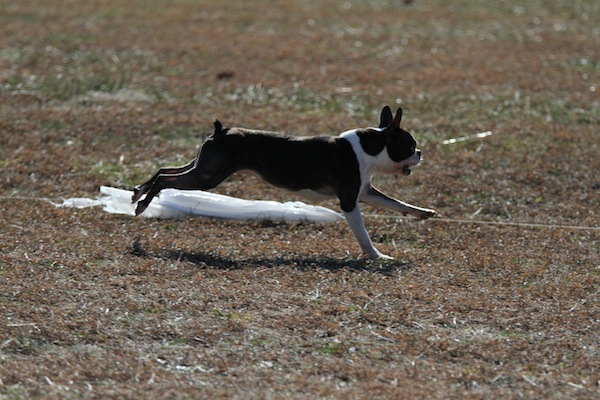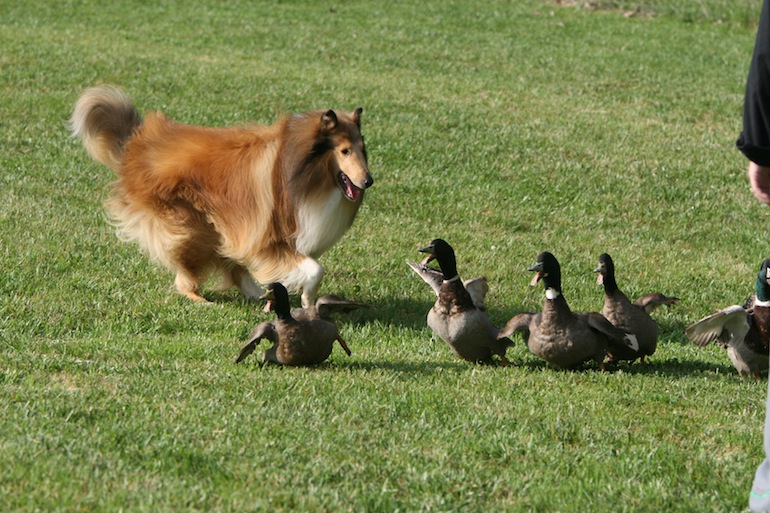It’s not primarily about the ribbons and titles but about forging a closer, more fulfilling bond between dog and owner. But let’s face it: After all that time and effort, adding an official title to your dog’s name can be awfully satisfying. Let’s take a look at the latest ways the AKC has enabled you to put an official title on your dog.
Get into the ACT
You don’t take your first swimming lesson in the deep end of the pool. And you wouldn’t learn much about tennis by facing the 122 mph serve of Serena Williams your first day on the court. In any sport it’s best to start at the ground floor, learn the fundamentals, and work your way up to high-level competition.
That’s why this summer the AKC Agility department rolled out the Agility Course Test, containing two new entry-level agility classes. The classes provide shorter courses than those at regular agility events, and they utilize basic obstacles appropriate for dogs and owners just getting into agility. Handlers are encouraged to have their dogs jump at the height they think best.
ACT is open to dogs 15 months of age or older. As in all AKC companion events, mixed-breed dogs are welcome—even dogs not yet AKC-registered or -listed may participate.
ACT can be used by clubs and trainers as the graduation exercise for their classes. It is offered at club-sponsored AKC Agility trials or as a standalone event at training centers. Holding ACT classes at a training facility provides dog-and-handler teams a familiar, low-stress setting for their first AKC event.
“This innovative program provides a bridge for new exhibitors to easily become involved with AKC Agility,” AKC Vice President Doug Ljungren says. “The foundation skills learned prepare a dog and owner for future success in agility and many other sports. We are excited about working together with the AKC training clubs and training facilities to introduce future generations of dogs and owners to AKC sports.”
Agility’s Lifetime Achievers
This year’s two summer roll-outs from AKC Agility are aimed at the opposite ends of the sport’s achievement spectrum: ACT for novices, and the new Agility Grand Champion (AGCH) title created to celebrate high-achieving dogs who excel across all AKC agility classes.
To earn the AGCH title, the following number of qualifying scores must be earned: Master Standard and Master Jumper with Weaves (100 qualifying scores from each class); Master Fast (75 qualifying scores); Time 2 Beat (75 qualifying scores); Premier Standard and Premier Jumpers with Weaves (50 qualifying scores from each class). Qualifying scores will be grandfathered and may be earned from either the Regular or Preferred classes, or a combination of these classes.
A note for those confused by the previous paragraph: If you don’t know what any of this means, you won’t be putting this title on your agility dog anytime soon. The AGCH is reserved for dogs who have demonstrated a high degree of skill and versatility over a lifetime.
Some Fur and a Blur
The popular Coursing Ability Test (CAT) is based on the sport of lure coursing, in which sighthound breeds (Greyhounds and their fleet-footed cousins) test their instinct for high-speed pursuit by chasing a plastic lure over a course of straight-aways and turns. Unlike the hound-specific realm of lure coursing, CAT is open to all breeds and mixed-breeds.
All AKC clubs licensed to hold lure-coursing trials or CAT are now automatically licensed to hold a Fast CAT event. In Fast CAT, a dog chases a lure during a timed 100-yard dash. Fast CAT may be held either standalone or in conjunction with other AKC events.
“The popularity of CAT demonstrates the enthusiasm of a dog when their inner instinct is awakened,” Ljungren says. “Now that same enthusiasm can be timed to determine how fast your dog can run. Who knows? You may have a national-caliber track star sitting next to you. The national rankings by breed will show how your dog compares.”
The event is open to all dogs at least a year old and individually registered or listed with the AKC (see sidebar).

Join Our Farm Team
Since the dawn of civilization, when humans ceased their wanderings and settled down to the pursuit of farming and herding, dogs and agriculture have been a natural combination.
Now, the new Farm Dog Certified (FDC) test, a series of 12 exercises, puts dogs in situations they would encounter in a rural setting. The basic test requirements are designed to demonstrate a dog’s trainability, self-control, confidence, and trust when working in partnership with their owner.
FDC is a noncompetitive pass/fail test that assesses a country dog’s overall conduct. (Think of it as a Canine Good Citizen test for farm dogs.) The dog must demonstrate self-control when exposed to livestock and other unique sights, sounds, and scents. Dogs earn the title by exhibiting confidence and a willingness to comply with instructions when confronting situations similar to those they might encounter on farms and in pastures.
The FDC test is open to all dogs at least 9 months old.
Both photos by Robert Young/AKC


